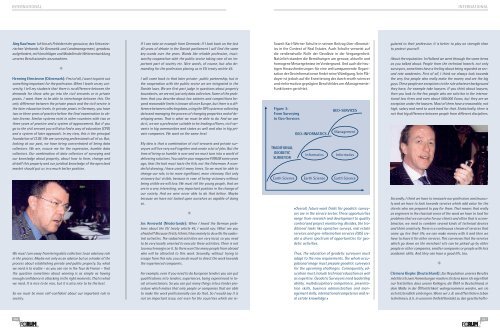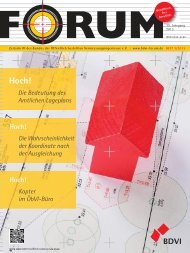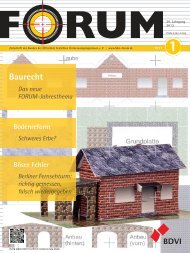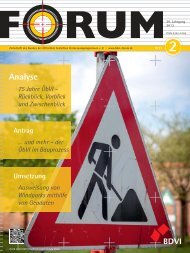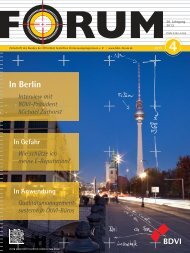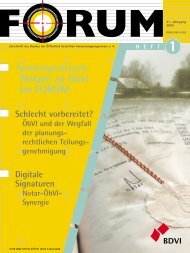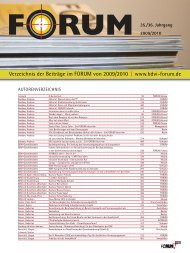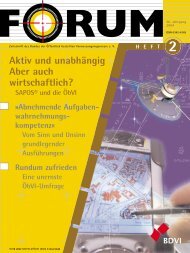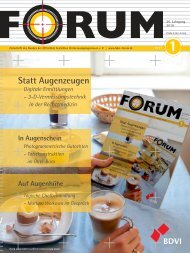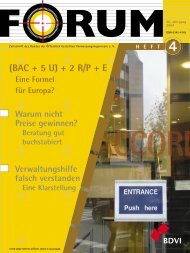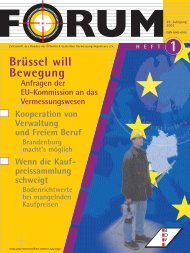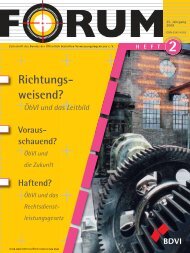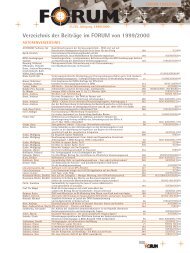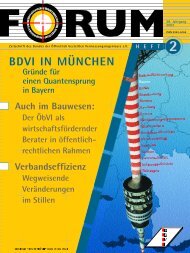Forum Heftes 2/2006
Forum Heftes 2/2006
Forum Heftes 2/2006
Erfolgreiche ePaper selbst erstellen
Machen Sie aus Ihren PDF Publikationen ein blätterbares Flipbook mit unserer einzigartigen Google optimierten e-Paper Software.
INTERNATIONAL<br />
Jürg Kaufman: Ich bin als Präsident der geosuisse, des Schweizerischen<br />
Verbands für Geomatik und Landmanagement, geradezu<br />
aufgefordert, mit Vorschlägen und Modellen die Weiterentwicklung<br />
unseres Berufsstandes anzumahnen.<br />
Henning Elmstroem (Dänemark): First of all, I want to point out<br />
something important for the profession. When I teach on my university,<br />
I tell my students that there is no difference between the<br />
demands for those who go into the civil servants or in private<br />
praxis. I want them to be able to interchange between this. The<br />
only difference between the private praxis and the civil service is<br />
the later education levels. In private praxis in Germany, you have<br />
two or three years of practice before the final examination to obtain<br />
license. Similar systems exist in other countries with two or<br />
three years of practice and a system of approvement. But if you<br />
go to the civil servant you will also find a way of education (CPD)<br />
and a system of later approvals. In my view, this is the principal<br />
foundation of CLGE. We are surveying professionals all of us. But,<br />
looking at our past, we have being concentrated of being data<br />
collectors. We are, excuse me for the expression, humble data<br />
collectors. Our combination of data collectors of surveying and<br />
our knowledge about property, about how to form, change and<br />
distaff this property and our juridical knowledge of the open land<br />
market should put us in a much better position.<br />
We must turn away from being data collectors to an advisory role<br />
in the process. Maybe not only as an advisor but as a leader of the<br />
process about establishing private and public property. So, what<br />
we need is to realize – as you can see in the Tour de France – that<br />
the question sometimes about winning is as simple as having<br />
enough confidence in attacking in the right moments. That is what<br />
we need. It is nice to be nice, but it is also nice to be the best.<br />
So we must be more self-confident about our important role in<br />
society.<br />
350<br />
2<br />
If I can take an example from Denmark: If I look back on the last<br />
40 years of debate in the Danish parliament I will find the same<br />
key-words over the years. Words like reliable profession, trustworthy<br />
cooperation with the public sector taking care of an important<br />
part of society etc. Nice words, of course, but also demanding<br />
for the profession placing us in EU treaty article 45.<br />
I will come back to that later private- public partnership, but in<br />
the cooperation with the public sector we are integrated in the<br />
Danish laws. We are first part judge in questions about property<br />
boundaries, we are not just only data collectors. Some of the problems<br />
that you describe about low salaries and competitions beyond<br />
reasonable limits is known all over Europe, but there is a difference<br />
between collecting data, using the GPS system or collecting<br />
data and managing the process of changing properties and of developing<br />
areas. That is what we must be able to do. And we can<br />
do it, we are a profession suitable to be leading officers, civil servants<br />
in big communities and states as well and also in big private<br />
companies. We work on the same level.<br />
My idea is that a combination of civil servants and private surveyors<br />
will live very well together and create a lot of jobs. But the<br />
time of being so humble is over and we must turn into a world of<br />
delivering solutions. You said in your magazine FORUM some years<br />
ago, that the bait must taste the fish, not the fisherman. A wonderful<br />
drawing, I have used it many times. So we must be able to<br />
change our role, to be more significant, more visionary. Not only<br />
visionary but visible, because in case of being visionary without<br />
being visible we will lose. We must tell the young people, that we<br />
are in a very interesting, very important position in the change of<br />
our society. And we were never able to do that before. Maybe<br />
because we have not looked upon ourselves as capable of doing<br />
so.<br />
Jos Anneveld (Niederlande): When I heard the German problems<br />
about the EU treaty article 45, I would say: What are you<br />
afraid of? Because firstly I think it has mainly to do with the cadastral<br />
activities. The cadastral activities are very local, so you need<br />
to be very locally oriented to execute these activities. There is not<br />
too much margin on it. So there won't be many people from abroad<br />
who will be attracted to this work. Secondly, without trying to<br />
escape from this rule, you can do much to direct the work towards<br />
the experienced companies .<br />
For example, even if you need to do European tenders you can put<br />
qualifications into tenders, experiences, being experienced in local<br />
circumstances. So you can put many things into a tender procedure<br />
which makes that only people or companies that are able<br />
to make the work professionally can do that. So I would say it is<br />
not an important issue, not even for the countries which are re-<br />
Soweit Karl-Werner Schulte in seinem Beitrag über »Geomatics<br />
in the Context of Real Estate«. Auch Schulte verweist auf<br />
die verdienstvolle Rolle der Geodäsie in der Vergangenheit.<br />
Natürlich standen die Bemühungen um genaue, aktuelle und<br />
homogene Messergebnisse im Vordergrund. Und auch die heutigen<br />
Herausforderungen für eine weltumspannende Organisation<br />
der Geoinformationen findet seine Würdigung. Sein Plädoyer<br />
ist jedoch auf die Erweiterung des durch »earth science«<br />
und »informatics« geprägten Berufsfeldes um »Management«-<br />
Funktionen gerichtet.<br />
Figure 3:<br />
From Surveying<br />
to Geo-Services<br />
TRADITIONAL<br />
GEODETIC<br />
SURVEYOR<br />
Earth Science<br />
GEO-INFORMATICS<br />
Informatics<br />
GEO-SERVICES<br />
Management<br />
Informatics<br />
Earth Science Earth Science<br />
»Overall, future work fields for geodetic surveyors<br />
are in the service sector. These opportunities<br />
range from research and development to quality<br />
control and project monitoring. Besides, the traditional<br />
tasks like operative surveys, real estate<br />
services and geo-information services (GIS) create<br />
a divers spectrum of opportunities for geodetic<br />
activities.<br />
Thus, the education of geodetic surveyors must<br />
adapt to the new requirements. The whole occupational<br />
image must prepare geodetic surveyors<br />
for the upcoming challenges. Consequently, education<br />
must include technical education as well<br />
as expertise. Geodetic Surveyors need leadership<br />
ability, multidisciplinary competence, presentation<br />
skills, business administration and management<br />
skills, international competence and real<br />
estate knowledge.«<br />
INTERNATIONAL<br />
gulated to their profession. It is better to play on strength than<br />
to protect yourself.<br />
About the reputation: In Holland we went through the same items<br />
as you talked about. People from the technical branch, not only<br />
surveyors, sometimes have a feeling about being regarded as second<br />
rate academics. First of all, I think we always look towards<br />
the very few people who really make the money and are the big<br />
guys. These people are exceptions to the rule whatever background<br />
they have, for example take lawyers. If you think about lawyers,<br />
then you look to the few people who are solicitor in the international<br />
law firms and earn about 500.000 Euros, but they are an<br />
exception under the lawyers. Most of them have a reasonable, not<br />
high, salary and need to work hard for that. Statistically, there is<br />
not that big difference between people from different disciplines.<br />
Secondly, I think we have to innovate our profession continuously<br />
and we have to look towards services which add value for the<br />
clients who are prepared to pay for them. That means that really<br />
as engineers in the classical sense of the word we have to look for<br />
problems that we can solve for our clients and often that is a combination,<br />
we need to combine several kinds of technical devices<br />
and think creatively. There is a continuous stream of services that<br />
come up, live their life, we can make money with it and then we<br />
have to leave it for other services. This can mean that the services<br />
which go down on the merchant site can be picked up by other<br />
people or other companies, smaller companies or people with less<br />
academic skills. And they can have a good life, too.<br />
Clemens Kiepke (Deutschland): Zur Reputation unseres Berufes<br />
möchte ich zwei Anmerkungen machen: Erstens kann ich eigentlich<br />
nur feststellen, dass unsere Kollegen, die ÖbVI in Deutschland, in<br />
dem Maße in der Öffentlichkeit wahrgenommen werden, wie sie<br />
sich letztendlich einbringen. Wenn wir z. B. am öffentlichen Leben<br />
teilnehmen, d. h. in unserem Umfeld Kontakt zu den gesellschafts-<br />
2<br />
351


